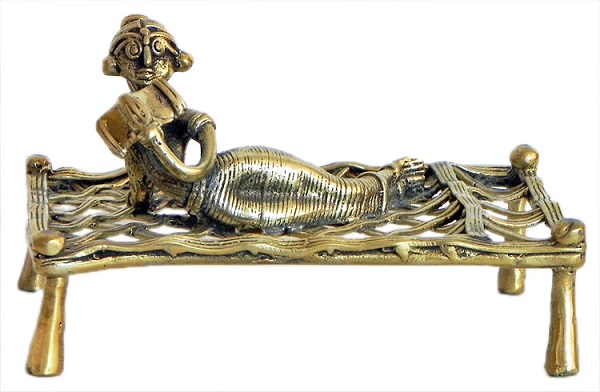FWP:
SETS == PARALLELISM; WORDPLAY
The two lines are intriguingly parallel, in ways that help the reader put them together. As an extra treat, the first line has daadah , and the second line has -taadah , in the same metrical position: one that spans the midpoint of the line. The effect is to give the verse a particularly rich sense of internal rhyme.
The body wordplay is obvious: 'teardrop'; 'head'; 'eye'; 'heart'; 'hand and foot'; 'breast' [bar]; there's also almost another 'head' [sar] in 'teardrop', for sirishk was also sometimes pronounced sarashk , and whether or not the aural rhyme existed, the visual wordplay would remain intact. Other forms of wordplay are pointed out by Faruqi.
The verse is awkwardly constructed. Both lines seem to depict the plight of a worn-out, debilitated lover who can no longer wander madly around the desert, scattering tears everywhere. Now he can only sit with lowered head, shedding tears into his own garment-hem, or lie helplessly in his own bedding. Both the garment-hem and the bedding are imagined as delighted with the lover's presence. (Compare the very different relationship between the lover and the bedding in the previous verse, {194,1}.)
But how much do we care what the garment-hem and the bedding feel? More to the point is the question of how the speaker (who may or may not be the lover himself) feels, and how we in the audience are meant to feel, about the lover's worn-out condition. In {81,4}, such mortal weakness is unmanly and contemptible. In {51,3}, the dying lover is a 'martyr to faithfulness' who deserves praise and congratulations. In the present verse, it's impossible to detect any such feeling-tone; and really the verse isn't powerful enough to inspire any great interpretive efforts.
For another use of sirishk-e sar bah .sa;hraa daadah , see {223,3x}.

Nazm:
The tear is the pupil of the eye of the garment-hem, and the bedding is the desired object of the invalid; that is, the tear always remains in the garment-hem; and from the sick heart's always remaining fallen on the bedding, it has acquired affection for the bedding. (217)
== Nazm page 217